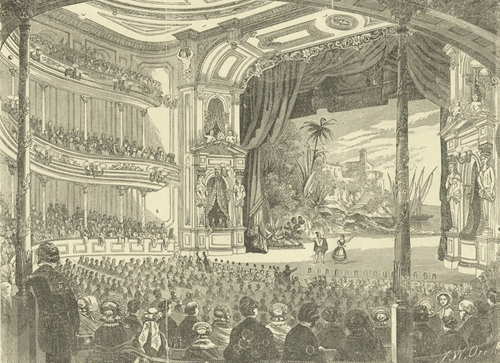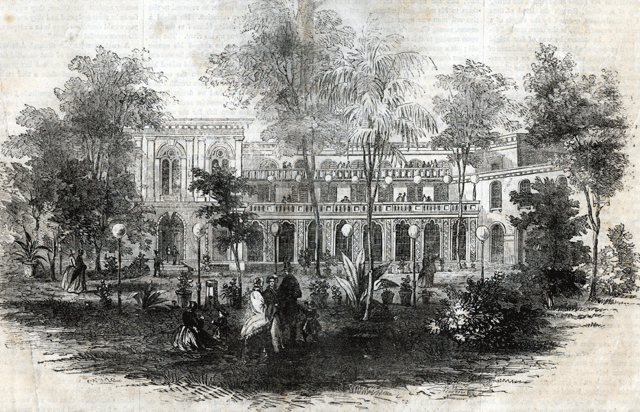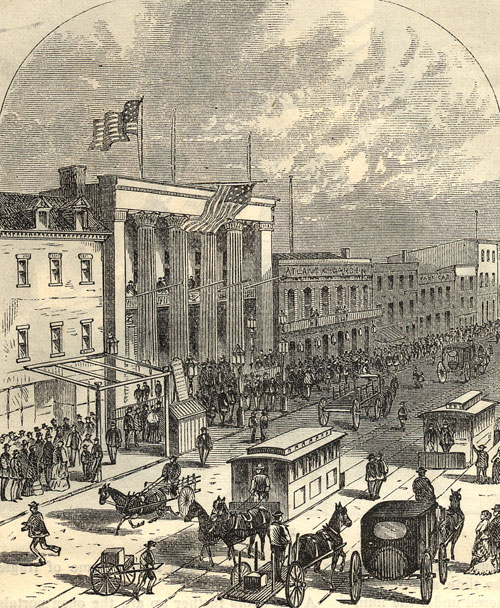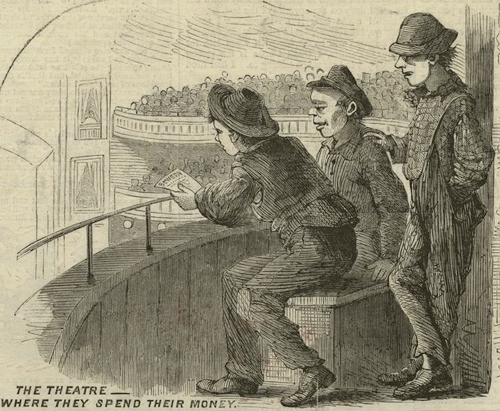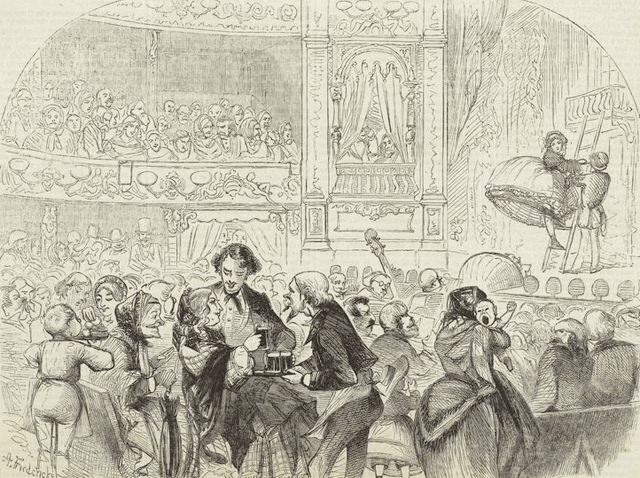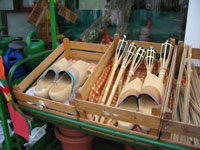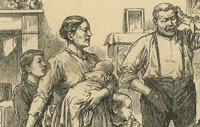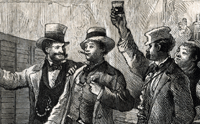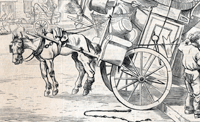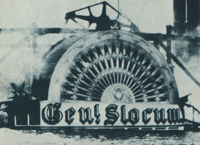"The Old Bowery Theatre, situated on the thoroughfare from which it takes
its name, below Canal street, is the only old theatre left standing in
the city. Three theatres have preceded it on this site, and all have
been destroyed by fire. Within the last few years, the interior of the
present theatre has been greatly modernized. The plays presented here
are of a character peculiarly suited to that order of genius which
despises Shakspeare, and hopes to be one day capable of appreciating the
Black Crook. "Blood and thunder dramas," they are called in the city.
The titles are stunning--the plays themselves even more so. A writer in
one of the current publications of the day gives the following truthful
picture of a "Saturday night at the Bowery:"
[Picture: THE OLD BOWERY THEATRE.]
"I had not loitered long at the entrance after the gas blazed up, when
from up the street, and from down the street, and from across the street,
there came little squads of dirty, ragged urchins--the true gamin of New
York. These at once made a gymnasium of the stone steps--stood on their
heads upon the pavements or climbed, like locusts, the neighboring
lamp-posts; itching for mischief; poking fun furiously; they were the
merriest gang of young dare-devils I have seen in a long day. It was not
long before they were recruited by a fresh lot of young 'sardines' from
somewhere else--then they went in for more monkey-shines until the door
should be unbarred. They seemed to know each other very well, as if they
were some young club of genial spirits that had been organized outside of
the barriers of society for a long while. What funny habiliments they
sported. It had never been my experience to see old clothes thrown upon
young limbs so grotesquely. The coat that would have been a fit for a
corpulent youth nearly buried a skinny form the height of your cane.
"And on the other hand, 'young dropsy's' legs and arms were like links of
dried 'bolonas' in the garments which misfortune's raffle had drawn for
him. Hats without rims--hats of fur, dreadfully plucked, with free
ventilation for the scalp--caps with big tips like little porches of
leather--caps without tips, or, if a tip still clung to it, it was by a
single thread and dangled on the wearer's cheek like the husk of a
banana. The majority seemed to have a weakness for the costumes of the
army and the navy. Where a domestic tailor had clipped the skirts of a
long blue military coat he had spared the two buttons of the waist-band,
and they rested on the bare heels like a set of veritable spurs. Shoes
and boots (and remember it's a December night) are rather scarce--and
those by which these savoyards could have sworn by grinned fearfully with
sets of naked toes. One 'young sport,' he had seen scarcely ten such
winters, rejoiced in a pair of odd-mated rubber over-shoes, about the
dimensions of snow-shoes. They saluted him as 'Gums.' A youngster, with
a childish face and clear blue eyes, now shuffled upon the scene.
"'O Lordy, here's Horace, jist see his get up.' A shout of laughter went
up, and Horace was swallowed in the ragged mob.
"'Horace' sported a big army cap like a huge blue extinguisher. He
wrapped his wiry form in a cut-down, long-napped white beaver coat, the
lapels of which were a foot square, and shingled his ankles as if he
stood between a couple of placards. I had seen the latest caricature on
the philosopher of the _Tribune_, but this second edition of H. G.
swamped it. I knew that that young rogue had counted upon the effect of
his white coat, and he enjoyed his christening with a gleeful face and a
sparkle in his blue eyes. O, for the pencil of a Beard or a Bellew, to
portray those saucy pug-noses, those dirty and begrimed faces! Faces
with bars of blacking, like the shadows of small gridirons--faces with
woful bruised peepers--faces with fun-flashing eyes--faces of striplings,
yet so old and haggard--faces full of evil and deceit.
"Every mother's son of them had his fists anchored in his breeches
pockets, and swaggered about, nudging each other's ribs with their sharp
little elbows. They were not many minutes together before a battle took
place. Some one had tripped 'Gums,' and one of his old shoes flew into
the air. I think he of the white coat was the rascal, but being dubbed a
philosopher, he did his best to look very wise, but a slap on the side of
the ridge of his white collar upset his dignity, and 'Horace' 'went in,'
and his bony fists rattled away on the close-shaven pate of 'Gums.'
"The doors are now unbarred, and this ragged 'pent up little Utica' rends
itself, but not without much more scratching and much swearing. O, the
cold-blooded oaths that rang from those young lips! As the passage to
the pit is by a sort of cellar door, I lost sight of the young scamps as
the last one pitched down its gloomy passage.
"In the human stream--in a whirlpool of fellow-beings--nudging their way
to the boxes and the upper tiers, I now found myself. It was a terrible
struggle; females screaming, were eddied around and around until their
very faces were in a wire cage of their own 'skeletons.'
"'Look out for pickpockets,' shouted a Metropolitan. Every body then
tried to button his coat over his breast, and every body gave it up as a
bad job. In at last, but with the heat of that exertion--the smell of
the hot gas--the fetid breath of two thousand souls, not particular,
many, as to the quality of their gin--what a sweltering bath follows!
The usher sees a ticket clutched before him, and a breathless individual
saying wildly, 'Where?' He points to a distant part of the house, and
the way to it is through a sea of humanity. A sort of a Dead Sea, for
one can walk on it easier than he can dive through it. I shall never
know how I got there at last; all I remember now are the low curses, the
angry growls and a road over corns and bunions.
"The prompter's bell tingles and then tingles again. The bearded Germans
of the orchestra hush their music, and the big field of green baize
shoots to the cob-web arch.
"Now is the time to scan the scene--that teeming house--that instant when
all faces are turned eagerly to the foot-lights, waiting breathlessly the
first sound of the actor's voice. The restlessness of that tossing sea
of humanity is at a dead calm now. Every nook and cranny is
occupied--none too young--none too old to be there at the rise of the
curtain. The suckling infant 'mewling and puking in its mother's arms.'
The youngster rubbing his sleepy eyes. The timid Miss, half frightened
with the great mob and longing for the fairy world to be created. Elder
boys and elder sisters. Mothers, fathers, and the wrinkled old
grand-sire. Many of these men sit in their shirt-sleeves, sweating in
the humid atmosphere. Women are giving suck to fat infants.
Blue-shirted sailors encircle their black-eyed Susans, with brawny arms
(they make no 'bones' of showing their honest love in this democratic
temple of Thespis). Division street milliners, black-eyed, rosy-cheeked,
and flashy dressed sit close to their jealous-eyed lovers. Little Jew
boys, with glossy ringlets and beady black eyes, with teeth and noses
like their fat mammas and avaricious-looking papas, are yawning
everywhere. Then there is a great crowd of roughs, prentice boys and
pale, German tailors--the latter with their legs uncrossed for a
relaxation. Emaciated German and Italian barbers, you know them from
their dirty linen, their clean-shaven cheeks and their locks redolent
with bear's grease.
"Through this mass, wandering from pit to gallery, go the red-shirted
peanut-venders, and almost every jaw in the vast concern is crushing
nut-shells. You fancy you hear it in the lulls of the play like a low
unbroken growl.
"In the boxes sit some very handsome females--rather loudly dressed,--but
beauty will beam and flash from any setting.
"Lean over the balcony, and behold in the depths below the famous pit,
now crowded by that gang of little outlaws we parted with a short time
ago.
"Of old times--of a bygone age--is this institution. In no other theatre
in the whole town is that choice spot yielded to the unwashed. But this
is the 'Bowery,' and those squally little spectators so busy scratching
their close-mown polls, so vigorously pummeling each other, so
unmercifully rattaned by despotic ushers--they are its best patrons.
"And are they not, in their light, great critics, too? Don't they know
when to laugh, when to blubber, and when to applaud, and don't they know
when to _hiss_, though! What a _fiat_ is their withering hiss! What
poor actor dare brave it? It has gone deep, deep into many a poor
player's heart and crushed him forever.
"The royal road to a news-boy's heart is to rant in style.
"Versatile Eddy and vigorous Boniface are the lads, in our day, for the
news-boys' stamps.
"Ranting is out of the female line, but Bowery actresses have a
substitute for it.
"At the proper moment, they draw themselves up in a rigid statue, they
flash their big eyes, they dash about wildly their dishevelled hair, with
out-stretched arms and protruding chins they then shriek out,
V-i-l-l-a-i-n!
"O, Fannie Herring! what a tumult you have stirred up in the roused pit!
No help for it, my dear lady. See, there's 'Horace,' standing on his
seat and swinging his big blue cap in a cloud of other caps--encore!
encore! And the pretty actress bows to the pit, and there is more joy in
her heart from the yells of those skinny little throats than from all the
flowers that ladies and gents from above may pelt her with.
"The bill of fare for an evening's entertainment at the Old Bowery is as
long as your cane, and the last piece takes us far into the night--yet
the big house sits it out, and the little ones sleep it out, and the
tired actor well earns his pay.
"I'll not criticise the acting--a great part of the community thinks it's
beyond the pale of criticism--this peculiarity of tearing things to
pieces, and tossing around 'supes' promiscuously.
"And another thing, those little ungodly imps down there have a great
appreciation of virtue and pathos. They dash their dirty fists into
their peepers at the childish treble of a little Eva--and they cheer, O,
so lustily, when Chastity sets her heavy foot upon the villain's heart
and points her sharp sword at his rascal throat. They are very fickle in
their bestowal of approbation, and their little fires die out or swell
into a hot volcano according to the vehemence of the actor. 'Wake me up
when Kirby dies,' said a veteran little denizen of the pit to his
companions, and he laid down on the bench to snooze.
"'Mind yer eye, Porgie,' said his companion, before Porgie had got a
dozen winks. 'I think ther's somthen goen to bust now.' Porgie's friend
had a keen scent for sensation.
"As I came out, at the end of the performance, I again saw 'Horace.' He
had just rescued a 'butt' from a watery grave in the gutter. 'Jeminy!
don't chaps about town smoke 'em awful short now'days!' was the
observation of the young philosopher.
"The theatre is almost the only amusement that the ragged newsboy has,
apart from those of the senses. The Newsboys' Lodging House, which has
been the agent of so much good among this neglected class of our
population, find the late hours of the theatre a serious obstacle to
their usefulness. It is safe to say that if the managers of the two
Bowery Theatres would close at an earlier hour, say eleven o'clock, they
would prosper as greatly as at present, and the boys who patronize their
establishments would be much better off in body and mind. An effort is
about to be made to obtain this reform from the managers
voluntarily--instead of seeking legislative aid. We are quite sure it
will be for the interest of all to close the theatres early."

